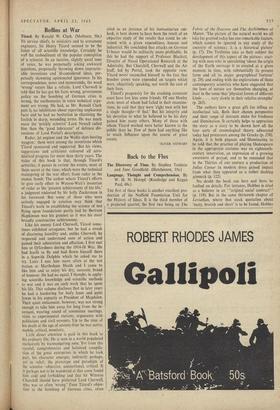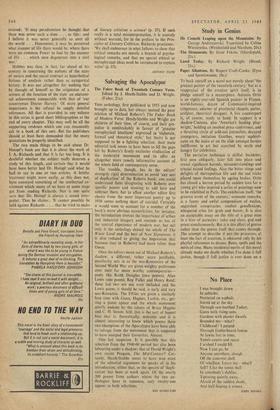Back to the Flux
The Discovery of Time. By Stephen Toulmin and June Goodfield. (Hutchinson, 35s.) THE first of these books is another excellent pro- duction of the Nuffield Foundation Unit for the History of Ideas. It is the third member of a projected quartet, the first two being on The Fabric of the Heavens and The Architecture of Matter. 'The picture of the natural world we all take for granted today has one remarkable feature, which cannot be ignored in any study of the ancestry of science: it is a historical picture' (p. 17). The Toulmins take as their subject the development of this aspect of the picture: start- ing with men who in speculating 'about the origin of the Earth envisage it as created at a given moment in time, with substantially its present form and all its major geographical 'features' (p. 29); and ending with the explorations of those contemporary scientists who have suggested that the laws of nature are themselves changing, at least in the sense that 'physical forces of different kinds . . . vary slowly in their relative strengths' (p. 265).
The authors have a great gift for telling an intellectual tale. Both their chosen perspective and their range of interests make for freshness and illumination. It certainly helps to appreciate the story as a story to be shown how all the four sorts of cosmological theory advocated today had precursors among the Greeks (p. 258). Again, it is both piquant and illuminating to be told that the practice of playing Shakespeare in the appropriate costume was an eighteenth- century innovation, an expression of a growing awareness of period; and to be reminded that in the Thirties of our century a production of Julius Caesar in modern dress gained impact from, what then appeared as a rather dashing gimmick (p. 122).
No doubt the book can here and there be faulted on details. For instance, Hobbes is cited as a believer in an "original social contract"' (p. 119). But in the same thirteenth chapter of Leviathan, where that stock quotation about 'nasty, brutish and short' is to be found, Hobbes insisted: 'It may peradventure be thought that there was never such a time . . . as this: and I believe it was never generally so over all the world . . . Howsoever, it may be perceived what manner of life there would be, where there were no common Power to feat by the manner of life . . . which men degenerate into a civil war.'
Hobbes was thus, in fact, far ahead of his century in construing the notions of the state of nature and the social contract as hypothetical fictions of analysis rather than as categorical history. It was not altogether for nothing that he thought of himself as the originator of a science of the function of the state an anatomi- cal achievement comparable with that of 'our countryman Doctor Harvey.' Of more general importance is the refusal to supply detailed references. All that is provided in any volume in this series is good short bibliographies at the end of every chapter. This may well be all the supporting evidence which one can reasonably ask in a book of this sort. But the publishers should at least have demanded that the many quotations be properly identified.
The two main things to be said about Dr. Hotopf's book are that it is about the work of I. A. Richards and that it is far too long. It is doubtful whether the subject really deserves a study .of this length, and certain that it would have been better had Dr. Hotopf said what he
had to say in one or two articles. A briefer treatment might more easily, as this does not, have conveyed something of the intellectual ex- citement which many of us have at some stage got from reading Richards. Nor is one quite sure that Dr. Hotopf is always a sound inter- preter. Thus he claims: `It cannot possibly be held against Richards . . . that he tried to make
of literary criticism a science' (p. 37). If such really is a total misinterpretation, it is scarcely without warrant, for in the preface to the Prin- ciples of Literary Criticism, Richards proclaims: `We shall endeavour in what follows to show that critical remarks are merely a branch of psycho- logical remarks, and that no special ethical or metaphysical ideas need be introduced to explain value' (p. 23).
ANTONY FLEW































 Previous page
Previous page